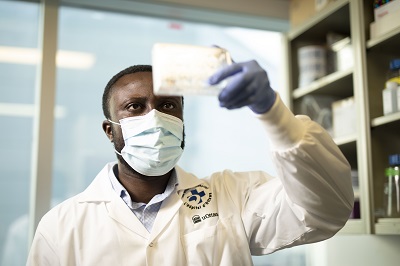 “If we can block this protein, chemotherapy may work better for ovarian cancer and immune cells can function at their optimum best,” said Dr. Asare-Werehene. “It’s like taking the immune cells to the gym to make them stronger.”As a child growing up in Ghana, Dr. Meshach Asare-Werehene knew he wanted to help sick people get better. Little did he know he would one day be a top expert in ovarian cancer.
“If we can block this protein, chemotherapy may work better for ovarian cancer and immune cells can function at their optimum best,” said Dr. Asare-Werehene. “It’s like taking the immune cells to the gym to make them stronger.”As a child growing up in Ghana, Dr. Meshach Asare-Werehene knew he wanted to help sick people get better. Little did he know he would one day be a top expert in ovarian cancer.
As a kid who was frustrated by the lack of science books in his local library, Dr. Asare-Werehene was eager to learn about investigating diseases during his medical laboratory bachelor’s degree at Kwame Nkrumah University of Science and Technology in Ghana. He fell in love with research and how it can help patients during his master’s degree in cancer immunology and biotechnology at the University of Nottingham in the U.K. It was The Ottawa Hospital’s strong reputation for integrating research into patient care that convinced Dr. Asare-Werehene to come to Ottawa in 2015 to complete his PhD in Dr. Benjamin Tsang’s lab.
“I happened to know that some of the ground-breaking work in the country came from The Ottawa Hospital and the University of Ottawa,” he said. “I felt at peace coming here, knowing that I would leave as a strong, independent researcher.”
Discovery could improve detection and treatment of ovarian cancer
During his PhD, Dr. Asare-Werehene made an important discovery that could improve both the detection and treatment of ovarian cancer.
Tumours that resist chemotherapy are a major challenge for treating ovarian cancer. Dr. Asare-Werehene found that chemo-resistant ovarian cancer cells produce large amounts of a protein called plasma gelsolin, which prevents cancer-killing immune cells from doing their job.
“If we can block this protein, chemotherapy may work better for ovarian cancer and immune cells can function at their optimum best,” he said. “It’s like taking the immune cells to the gym to make them stronger.”
Another challenge with ovarian cancer is there is no reliable screening test to catch it early, when it is most treatable. A blood test for plasma gelsolin could be a solution. A study his team published found plasma gelsolin was better at detecting early-stage ovarian cancer than the commonly used cancer antigen 125. It was also better at predicting the amount of cancer cells left in the body after surgery, information that could help physicians and their patients choose the best treatment option.
But Dr. Asare-Werehene isn’t done yet. He’s assembled a multidisciplinary team to investigate whether nano-sized particles in the blood called exosomes can be used to detect early-stage ovarian cancer and predict resistance to chemotherapy. This research could lead to the development of individualized treatment strategies with fewer side-effects.
A passion for nature and science communication and inspiring the next generation
When he’s not busy running experiments, mentoring lab members or setting up video calls with international collaborators, Dr. Asare-Werehene is usually at home with his family or at church. He loves spending time in nature, including fishing, boating, and skiing.
“I paint a lot, and I love to cook, it’s like therapy for me. And I like to be loud when I have my friends over – I like to talk a lot!” says this gregarious researcher.
Dr. Asare-Werehene has published 14 peer-reviewed articles and book chapters, an impressive number for an early-career researcher.
“Growing up I thought and behaved like a researcher, but I didn’t have anyone who looks like me who I could look up to and say ‘I want to be that person.’ Most people who identify as Black don’t get that opportunity,” he said. “I’m excited that generations coming after me will know that ‘Meshach was there, and that means it is possible for us to be there too.’”
Not content leaving his knowledge in academia, he’s also written a book for the general public called The ABCs Of Cancer: Separating The Facts From The Myths, which was named as a finalist for The US National Indie Excellence® Awards.
“I feel like I’m at that place where I could lend a hand to fighting cancer,” Dr. Asare-Werehene said. “The work I’m doing is going to touch lives. Although I’ve had challenges, I didn’t allow those challenges to overcome who I want to be.”
About The Ottawa Hospital
The Ottawa Hospital is one of Canada’s top learning and research hospitals, where excellent care is inspired by research and driven by compassion. As the third-largest employer in Ottawa, our support staff, researchers, nurses, physicians, and volunteers never stop seeking solutions to the most complex health-care challenges. Our multi-campus hospital, affiliated with the University of Ottawa, attracts some of the most influential scientific minds from around the world. Backed by generous support from the community, we are committed to providing the world-class, compassionate care we would want for our loved ones. www.ohri.ca
About the University of Ottawa
The University of Ottawa is home to over 50,000 students, faculty and staff, who live, work and study in both French and English. Our campus is a crossroads of cultures and ideas, where bold minds come together to inspire game-changing ideas. We are one of Canada’s top 10 research universities—our professors and researchers explore new approaches to today’s challenges. One of a handful of Canadian universities ranked among the top 200 in the world, we attract exceptional thinkers and welcome diverse perspectives from across the globe. www.uottawa.ca
Media Contact
Jenn Ganton
613-614-5253
jganton@ohri.ca
